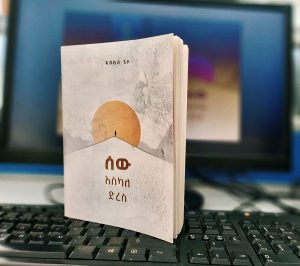
Yalew Azanaw, known by his pen name Dibekulu Geta, emerges as a distinctive voice in contemporary Ethiopian poetry. With Sew Eskale Dres (Till the Last Breath), his third collection, he invites readers into an intimate exploration of existence, memory, love, and the everyday fabric of Ethiopian life. This 116-page volume, priced at 297 ETB ($20), marks a significant contribution to the nation’s literary landscape.
Setting the Tone: Beauty over pain

From the outset, Dibe establishes his intent to focus on life’s beautiful moments rather than its sorrows. Despite being in his 30s, his voice carries the weight of someone who has traversed many emotional landscapes. His poems vividly reflect this choice, choosing to depict pleasant memories and highlight the meaningful. Dibe articulates a worldview where everything holds intrinsic value and purpose. From the grand to the minuscule—creatures, emotions, events—each thread weaves into the larger tapestry of life. This belief grounds the collection, emphasizing the importance of even the smallest details and reminding readers of the interconnectedness of all things.
Innovative Structure: Poetry in every layer
A striking feature of Sew Eskale Dres is its poetic table of contents, crafted not as a dry list but as verse. This lyrical mood sets the tone before the first poem. The book is carefully segmented by themes and emotional tones, allowing readers to journey smoothly from one poem to another. The preface, titled Sintun (Aspiration), is itself a poem where Dibe confesses his emotional fatigue in capturing life’s essence. He admits to focusing on life’s outer beauty, leaving deeper pain unspoken, aligning with the collection’s broader aesthetic.
The dual aspect of life
The first poem, Hiwot (Life), examines the ups and downs of existence. Dibe likens life to the moon’s cycle and the sun’s brightness, reflecting the duality of experiences—half full, half empty.
“Childhood, adulthood, and growth, Knowledge towards right and wrong,
The vicious circle that teaches everything, Reflects the face of human nature,
A creature made of laughter, bitterness.”
In this verse, the poet underscores that there is no absolute right or wrong, asserting the importance of relativism. A similar thought arises in Yesew Zer (A Human Descendant), positioned at the book’s end, where he acknowledges his mistakes yet claims his humanity.
“With all the mistakes I commit, I am absolutely right,
As a human descendant.”
The art of forgetfulness and acceptance
Yemersat Tibeb (The Art of Forgetfulness) echoes this sentiment, suggesting that humans are not free from mistakes. He contemplates predestination and the imperfections of life. He notes how people inflict harm on one another, only to regret it later. Thus, he proposes that acceptance and forgetfulness are essential for navigating life’s imperfections.
In Bichegnaw Emnet (The Sole Faith), Dibe craves relief, positing that true tranquility comes from surrendering to loss.
“The guarantee of life,
The key to interpret mystery,
Is having the courage to say ‘let it be.”
Celebrating friendship and beauty
In Eneho And Meba (A Tribute), the speaker evokes cherished memories experienced during difficult times, inviting a friend to create an artistic piece reflecting their shared joy. He emphasizes that intimacy and understanding form the foundation of mutual happiness.
The subsequent poem, Aynm Aytegibim Wubetm Ayalkm (The Eye Can’t Stop Desiring and the Beauty Will Not Fade Away), continues this theme, celebrating the allure of women in his country. Dibe muses on the challenge of remaining faithful in a world brimming with beauty.
The silence of lost love
Mulu Kutr Zero (Even Number Zero) narrates a romantic tale where unexpressed feelings lead to profound loss. The poet reflects on the fragility of life, lamenting that we often fail to appreciate what we have until it is gone.
This idea extends in Helawe (Reality), where Dibe notes that expectation is a shared reality among humans, emphasizing that life is marked by waiting—whether for love, opportunities, or ultimately, death.
“We always hold a certain reality;
Waiting remains life’s eternal irony.”
Honoring ordinary lives
In Yehelewna Tinsh Yelewm (Every Little Thing Holds Worth), the poet highlights the significance of every atom, emotion, and action in life. He illustrates the interdependence of all living things, demonstrating how even the smallest elements play a crucial role in the ecosystem.
Dibe emphasizes that perspective shapes our understanding of worth, concluding:
“Every little thing holds worth, As everyone is lord in their own world.”
This theme continues in Bichegnit (A Lonely Woman), which portrays a woman illuminating the darkness. Tertaw Tarik (Life in the Ordinary) pays tribute to ordinary citizens, underscoring that even without fame, their stories matter.
Societal critique and silent reflection
However, society also creates divisions that can lead to conflict. This tension is poignantly captured in Solomon Deresa, honoring the late poet while critiquing societal flaws. Dibe expresses exhaustion from constant critique, suggesting that people often learn only through personal experience, a sentiment echoed in Kuankua Kirets Learmimo (Find a Language for Silence).
Conclusion
The collection, comprising 116 pages, touches on artistic, personal, social, philosophical, and national themes, reflecting life among ordinary people through poetry. Dibe emphasizes the beauty in everyday routines, solidifying his place in Ethiopian literature.
About the poet
Dibekulu Geta is more than a poet; he is a journalist and cultural commentator who offer a deeply personal perspective in his work. Unlike his collaborative projects, Sew Eskale Dres is a testament to his individual creativity. His writing philosophy seeks to reveal the mysteries of human existence without succumbing to despair, often reflecting on the beauty found in daily life.
BY YOHANES JEMANEH
THE ETHIOPIAN HERALD SUNDAY EDITION 8 JUNE 2025
